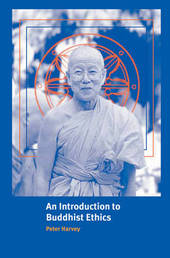
|
An Introduction to Buddhist Ethics: Foundations, Values and Issues
Hardback
Main Details
| Title |
An Introduction to Buddhist Ethics: Foundations, Values and Issues
|
| Authors and Contributors |
By (author) Peter Harvey
|
| Series | Introduction to Religion |
|---|
| Physical Properties |
| Format:Hardback | | Pages:500 | | Dimensions(mm): Height 229,Width 152 |
|
| Category/Genre | Buddhism |
|---|
| ISBN/Barcode |
9780521553940
|
| Classifications | Dewey:294.35 |
|---|
| Audience | | Professional & Vocational | | General | | Tertiary Education (US: College) | |
|---|
| Illustrations |
10 Halftones, unspecified
|
|
Publishing Details |
| Publisher |
Cambridge University Press
|
| Imprint |
Cambridge University Press
|
| Publication Date |
22 June 2000 |
| Publication Country |
United Kingdom
|
Description
This systematic introduction to Buddhist ethics is aimed at anyone interested in Buddhism, including students, scholars and general readers. Peter Harvey is the author of the acclaimed Introduction to Buddhism (Cambridge, 1990), and his new book is written in a clear style, assuming no prior knowledge. At the same time it develops a careful, probing analysis of the nature and practical dynamics of Buddhist ethics in both its unifying themes and in the particularities of different Buddhist traditions. The book applies Buddhist ethics to a range of issues of contemporary concern: humanity's relationship with the rest of nature; economics; war and peace; euthanasia; abortion; the status of women; and homosexuality. Professor Harvey draws on texts of the main Buddhist traditions, and on historical and contemporary accounts of the behaviour of Buddhists, to describe existing Buddhist ethics, to assess different views within it, and to extend its application into new areas.
Reviews'Marks the beginning of a new era in the study of Buddhist ethics ... an accessible and authoritative way in to a subject that is sure to become one of the major growth areas in Buddhist Studies.' Expository Times 'This volume will undoubtedly carve out a niche for itself in terms of the information it provides, for both the general audience and the serious scholar.' Religion
|